Blinken calls for calm in Mideast
Criticism of Israel's new far-right, ultra-religious coalition government has mounted this week amid spiraling violence between Israeli security forces and Palestinians. An Israeli aircraft struck what the military said was a rocket production site in the Gaza Strip overnight Thursday in response to rockets fired from the Palestinian territory.
Last week, 10 Palestinians, including two civilians, were killed in a raid by Israeli security forces in the city of Jenin in the Israeli-occupied West Bank, after which seven people were killed in a terror attack outside a synagogue in a settlement in East Jerusalem. A 13-year-old Palestinian boy also shot and wounded two Israeli men in East Jerusalem.
Israel announced that the family homes of the Palestinian attackers were being sealed and would be demolished, and took steps towards other punitive measures against the families, including potentially stripping them of their residency and citizenship rights and deporting them.
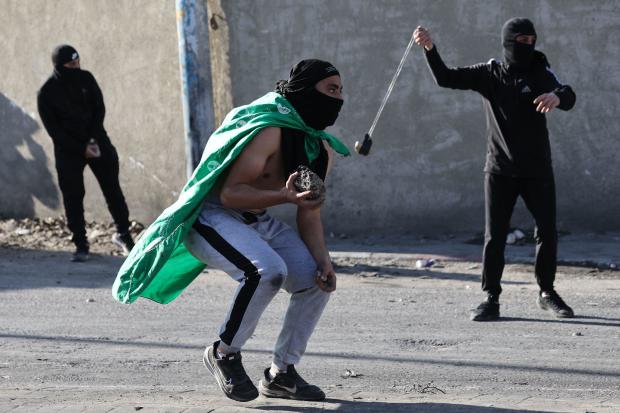
"We are not seeking an escalation, but we are prepared for any scenario," Israeli Prime Minister Benjamin Netanyahu told his cabinet. "Our answer to terrorism is a heavy hand and a strong, swift and precise response."
"Explosive potential"
Netanyahu recently began his sixth term as Israel's prime minister — a return to power that was only possible by him forging a coalition with members of extremist, far-right and ultra-religious political parties that had long existed on the fringes of Israeli politics.
Since returning to office, Netanyahu has appointed some of these controversial figures to leadership roles within his government, including finance minister Bezalel Smotrich, who was once arrested for allegedly organizing an attempted terror attack and is a self-avowed "proud homophobe," and Itamar Ben-Gvir, a radical ultra-nationalist who has chanted "death to Arabs" in the past and was convicted of inciting racism and supporting a terrorist organization.
As the new Minister for National Security, Ben-Gvir is now in charge of Israel's police.
Mounir Marjieh, an advocate for Palestinians in East Jerusalem, told CBS News that Palestinians living in the occupied territories expected more violence at the hands of Israeli police and military forces, and a further curtailing of rights under the new extremist coalition.
"Palestinians are coping with a system that is built on the premise of Jewish domination, hegemony and superiority," Marjeih said. "It's a daily struggle to live here, to stay here."
One of Ben-Gvir's first acts in his new role was to visit the highly sensitive site in Jerusalem that Jews call the Temple Mount and Muslims call Haram al-Sharif, the al-Aqsa Mosque compound. His visit was seen by many inside and outside Israel as a challenge to the status quo arrangement under which the site has long been managed to maintain peace. The visit drew a warning from the U.S. State Department against "any unilateral actions that undercut the historic status quo."
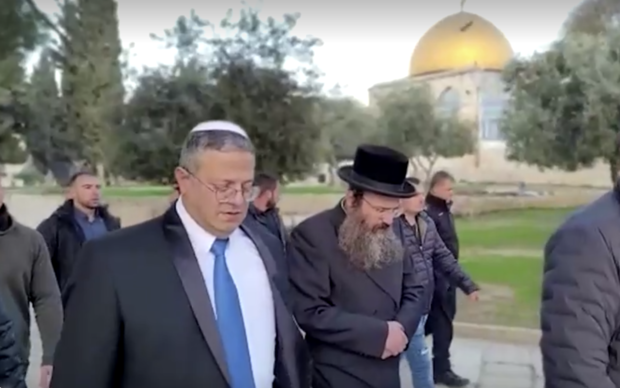
"What Ben-Gvir has done is very risky in so many ways," Marjeih said. "We are speaking about one of the most volatile geographic locations in Jerusalem. … There is a very clear arrangement that governs that place. Breaching that arrangement has an explosive potential."
Ben-Gvir has already banned the Palestinian flag from being flown in public spaces. He's seeking to amend gun laws to make it easier for Israelis to procure firearms, and has pledged to accelerate settlement building in the occupied West Bank. New settlement construction undermines any eventual two-state solution that would see an independent Palestinian nation created alongside Israel. He has also vowed to loosen the rules of engagement for police and soldiers, and pledged tougher treatment of Palestinian prisoners.
"I think there is enough reasons after the appointment of that Israeli politician to feel constant, to feel constant fear," said Marjeih.
Boaz Bismuth, a member of Israel's Knesset, or parliament, from Netanyahu's Likud party, told CBS News that Ben-Gvir had "made mistakes in the past … but he told me, 'I made mistakes. I have changed,' and I believe him."
Bismuth said Ben-Gvir "detests terrorists … but doesn't detest or hate Arabs."
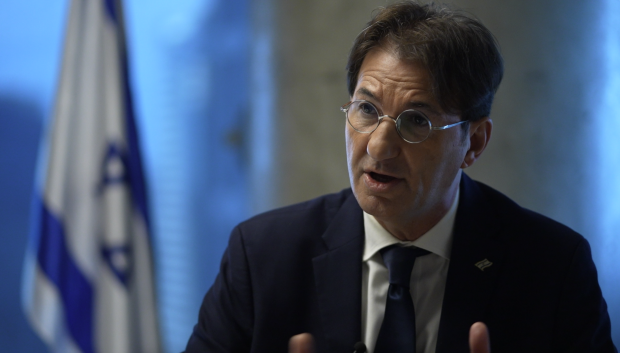
U.S. Secretary of State Anthony Blinken visited the region earlier this week and met Israeli and Palestinian leaders. He voiced America's continued support for a two-state solution, but said ending the conflict was "fundamentally up to them. They have to work together to find a path forward that both defuses the current cycle of violence and, I hope, also leads to positive steps to build back some confidence."
When asked if he supported a two-state solution, Bismuth said, "No."
"My message to America is, thank God … that we are friends," he said. "We share the same values. Yet we can also disagree."
"A dramatic change"
Some Americans who have made their lives in Israel expressed deep concern over the new government and the direction in which the country is headed. Tens of thousands of Israelis have gathered on the streets of Tel Aviv to protest against the proposed judicial reforms, as well as proposed changes to anti-discrimination legislation that could see the rights of women, LGBTQ+ people, liberal Jews and other minority groups curtailed, in some cases for religious reasons.
"Americans have to know that this is not just a continuation of other right-wing governments. This is a dramatic change," Moshe Chertnov, who grew up in California and moved to Israel in the 1970's to live on a socialist kibbutz, told CBS News. "I don't understand what kind of extreme Judaism that is. It's definitely not the Judaism that I knew or that I'd say 75% of American Jews know."
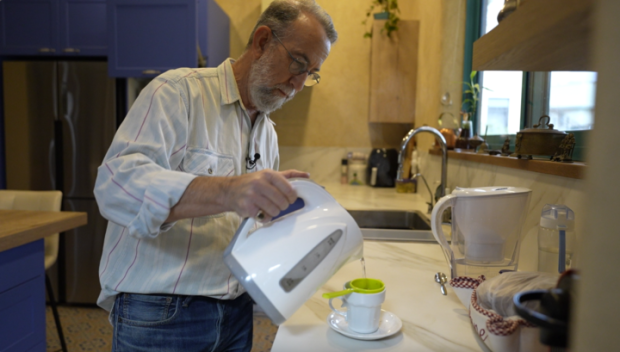
Some prominent Jewish Americans in the U.S. also have concerns about the changes Israel's new hardline government may usher in. On Wednesday, nearly 170 prominent American Jewish leaders published an open letter calling for "a critical and necessary debate about Israeli policies."
"Our criticisms emanate from a love for Israel and a steadfast support for its security and wellbeing," the letter said. "Some will try to dismiss their validity by labeling them antisemitic. We want to be clear that, whether or not one agrees with a particular criticism, such critiques of Israeli policy are not antisemitic. Indeed, they reflect a real concern that the new government's direction mirrors anti-democratic trends that we see arising elsewhere — in other nations and here in the U.S., rather than reinforcing the shared democratic values that are foundational to the U.S.-Israel relationship.
Abraham Foxman, a Holocaust survivor and the former leader of the Anti-Defamation League, told CBS News that if the new Israeli government undermines civil rights or democracy in Israel, it could leave many American Jews with some serious questions.
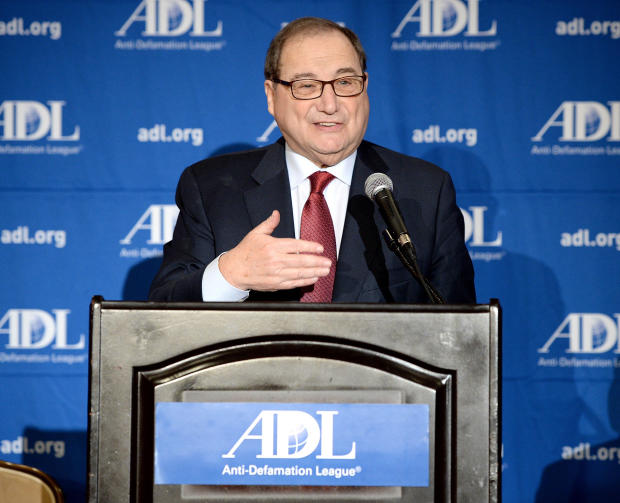
"The escalation in violence makes it more urgent for the Netanyahu government to make compromises in some of the proposed legislation to maintain the support of allied democracies and the diaspora Jewish communities," Foxman said. "The Jewish community, especially in the United States, is a liberal community. Judaism has liberal values. If the values in the state of Israel change vis-à-vis relationships with the LGBT community, the non-Orthodox, Arabs, etc., it will impact the relationship. ... I want this government to know that if it tampers with democracy, if it tampers with the basic relationship between Israel and the Jewish people, it will have consequences. The consequences will be: it will be more difficult to defend Israel."
Opposition Israeli Knesset member and Reform rabbi Ghilad Kariv told CBS News that only half of Israelis had voted for the new government, and a majority are not ultra-religious.
"Our duty is not to give up. Our duty is to remember that many Western democracies are facing major challenges in the last few years, and today," Khariv said. "We are part of a global wave of ultra-nationalism and the rise of the far-right. You see it in Europe. You also see it in America. And our duty is to remember that there are millions of Israelis that are fully committed to the core democratic and liberal values of Israel."
- In:
- Palestine
- Jerusalem
- Israel
- Palestinians
- Judaism
- Benjamin Netanyahu
Haley Ott is a digital reporter/producer for CBS News based in London.
Thanks for reading CBS NEWS.
Create your free account or log in
for more features.


